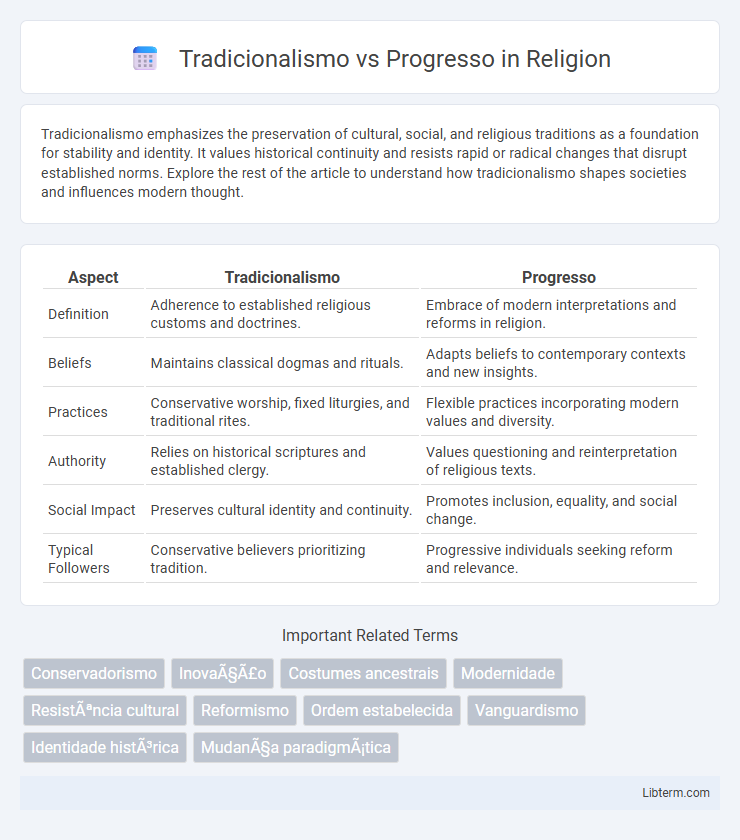Tradicionalismo emphasizes the preservation of cultural, social, and religious traditions as a foundation for stability and identity. It values historical continuity and resists rapid or radical changes that disrupt established norms. Explore the rest of the article to understand how tradicionalismo shapes societies and influences modern thought.
Table of Comparison
| Aspect | Tradicionalismo | Progresso |
|---|---|---|
| Definition | Adherence to established religious customs and doctrines. | Embrace of modern interpretations and reforms in religion. |
| Beliefs | Maintains classical dogmas and rituals. | Adapts beliefs to contemporary contexts and new insights. |
| Practices | Conservative worship, fixed liturgies, and traditional rites. | Flexible practices incorporating modern values and diversity. |
| Authority | Relies on historical scriptures and established clergy. | Values questioning and reinterpretation of religious texts. |
| Social Impact | Preserves cultural identity and continuity. | Promotes inclusion, equality, and social change. |
| Typical Followers | Conservative believers prioritizing tradition. | Progressive individuals seeking reform and relevance. |
Introdução ao Tradicionalismo e Progresso
Traditionalism emphasizes preserving cultural heritage, social norms, and established institutions as foundations for stability and identity. Progress advocates for innovation, reform, and adaptation to changing conditions to promote social advancement and improved quality of life. The debate between traditionalism and progress centers on balancing respect for historical values with the necessity for societal evolution.
Origens Históricas dos Dois Conceitos
Traditionalism finds its roots in the preservation of established customs, social structures, and cultural norms dating back to feudal and medieval societies. Progress emerged from Enlightenment ideals emphasizing reason, scientific advancement, and social reform as catalysts for human improvement. Both concepts historically diverged in response to societal transformations during the Industrial Revolution and modern political movements.
Valores Centrais do Tradicionalismo
The core values of Tradicionalismo emphasize preserving cultural heritage, social order, and religious beliefs as foundations for stable societies. Respect for authority, family structure, and community cohesion underpins traditionalism's approach to governance and moral conduct. These principles contrast with progressivism, which prioritizes innovation, social reform, and individual rights over established customs.
Princípios Fundamentais do Progresso
Principios fundamentais do progresso incluem a valorizacao da inovacao, a busca continua por melhorias e a adaptacao as mudancas sociais e tecnologicas para promover desenvolvimento sustentavel. O progresso enfatiza a ciencia, educacao avancada e igualdade de oportunidades como motores essenciais para o crescimento economico e social. Esse paradigma rejeita a rigidez das tradicoes em favor de solucoes dinamicas e inclusivas que atendam as demandas contemporaneas.
Tradição Cultural vs Inovação Social
Traditionalism anchors cultural identity by preserving historical customs, rituals, and values deeply rooted in community heritage. Social innovation challenges these legacies by introducing progressive ideas, technologies, and practices aimed at enhancing social equity and adaptability. Balancing cultural tradition with social innovation fosters sustainable development that honors collective memory while embracing necessary change.
O Papel da Religião e Moralidade
Traditionalism anchors society in religious doctrines and moral codes that provide a stable ethical framework, emphasizing continuity and communal values. Progressivism challenges these established norms, advocating for moral flexibility and secular ethics to promote social innovation and individual rights. The dynamic tension between religion-driven morality and secular progressivism shapes cultural debates and policy decisions in modern societies.
Educação: Conservadorismo ou Modernização?
Traditionalism in education emphasizes preserving established curricula, classical literature, and discipline, reinforcing cultural heritage and moral values. Progressivism advocates for student-centered learning, critical thinking, and integration of technology to adapt education to contemporary societal needs. The debate centers on balancing foundational knowledge with innovative methods to cultivate both respect for tradition and readiness for future challenges.
Política: Resistência ou Adaptação às Mudanças
Traditionalism in politics often manifests as resistance to change, emphasizing the preservation of established institutions and cultural norms to maintain social stability. Progressive political movements advocate for adaptation and reform, seeking to address emerging societal needs through innovation and policy transformation. The dynamic interplay between these perspectives shapes governance strategies, influencing how societies respond to modernization and globalization challenges.
Impactos Econômicos de Cada Abordagem
Traditionalism emphasizes preserving established economic structures, often resulting in stability but limited innovation and slower growth. Progressivism drives economic expansion through technological adoption and market reforms, fostering increased productivity and new industries. Each approach impacts employment patterns, investment flows, and long-term GDP differently, shaping national economic trajectories.
Caminhos Para Conciliar Tradicionalismo e Progresso
Balancing tradicionalismo and progresso involves integrating cultural heritage with innovative practices to foster sustainable development. Emphasizing community engagement and education helps preserve traditional values while embracing technological advancements that drive economic growth. Collaborative policymaking and adaptive frameworks are essential for harmonizing respect for traditions with the demands of modernization.
Tradicionalismo Infographic

 libterm.com
libterm.com